St. Nicholas/Volume 32/Number 4/League
The St. Nicholas League
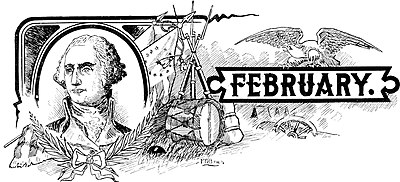
“A Heading for February.” By Frank P. O’Brien, age 16. (Gold Badge.)
THE PLEASURES OF MEMORY.
By Sibyl Kent Stone (age 15.)
(Gold Badge)
An “Episode from French History” has been a popular subject, and so many interesting anecdotes and incidents have been received that we have been obliged to leave out more good contributions than we have had room to publish, For one thing, we have been compelled to omit almost everything about the three favorite heroines in French history: Joan of Arc, Marie Antoinette, and Charlotte Corday. More than half of the contributions received told the brave, sad stories of these three famous women—one a peasant girl, one a queen, the third a patrician who was yet willing to die in the cause of Liberty for all. We do not print their stories because they are already familiar to those who have studied French history, and are a part of every school curriculum. Joan, who found her way from the peasant hut at Domremy to Orléans and Rheims, to crown a king who let her perish at the stake; Antoinette of Austria, fair, frivolous, and lovable in her youth, wise and sweet in womanhood, dying at last calmly and nobly, as a queen should die; Charlotte of Normandy, who strengthened her arm to slay a monster and paid for bis wretched life with her own—their well-known stories we have put by for incidents and episodes less widely known, or perhaps for some picturesque retelling of a familiar scene. For, as we have often said before, we must select for the reader as well as for the writer, and this is what every magazine editor does, To teach this point of view in the League is only preparing its members for the methods of these grown-up periodicals which some day will be considering, and, we hope, accepting a great many of our contributions.
It seems curious that any one who can write a poem good enough to take a prize should try to rhyme “meet” with “keep,” especially after we haye so often inveighed against the effort which some of our young friends make to unite varying consonant sounds. No poet has been allowed to do so to any extent since Chaucer, and Chaucer’s license would be revoked if he were to take any such liberties in this day of trained cars and eyes. “Skate” does not rhyme with “flake,” “sun” does net rhyme with “come,” nor do any two words having different consonant sounds, It should not be necessary for the editor to tell the contributors this—their ears ought to tell it to them; and while our young poets may, in their school verses, compromise with rhymes and mix their meters, if they choose, prize-winning in the League does not lie in that direction, “Sun” rhymes with “fun” and “gun” and “run” and “done.” “Skate” rhymes with “date” and “plate” and “obviate’’; “meet” with “fleet,” “complete,” and “hard to beat? Also, do net try to rhyme “dawn” with “morn.” There are persons, we regret to say, who forget that the letter r has any right to be heart, and pronounce “morn” as if it were spelled “mawn,” but no such persons have places on the staff of St. Nicholas, and the letter r in the League office is accorded a full and fair hearing.
PRIZE WINNERS, COMPETITION No. 62.
In making the awards, contributors’ ages are considered.
Verse. Gold badge, Sibyl Kent Stone (age 15}, 90 Mt. Vernon St., Boston, Mass,
Silver badges, Ethel Dickson (age 15), St. Gabriel’s School, peekskill N. Y., and Katherine Rutan Newmann (age 11), St. Gabriel’s School, Peekskill, N. Y.
Prose. Gold badges, Martin Janowitz (age 15), 387 Jefferson St., Buffalo, N. Y., and Francis Marion Miller (age 12), Oak Grove Ave., Hasbrouck Heights.
Silver badges, Persis Parker (age 14), Julesburg, Colo., and Marian van Buren (age 8), 15 Promenade des Anglais, Nice, France.
Drawing. Gold badges, Frank P. O’Brien (age 16), 1613 S. 18th St., S. Phila., Pa., and Dorothy Ochtman (age 12), Coscob, Conn.
Silver bbadges, Will Bymes (age 15). 1430 Granville Pl, St. Louis, Mo., and Katherine Dulcebella Barbour (age 12), Montebello, Cal.
'Photography. Gold badges, Miles W. Weeks (age 17), 467 Commonwealth Ave., Boston, Mass., and Edward A. Niles (age 10), Concord, N. H.
Silver badges, Seward C. Simons (age 15), 170 Arroyo Terrace, Pasadena, Cal., and James M. Walker (age 13), 1726 Prairie Ave., Chicago, Il.
Wild Animal and Bird Photography. First prize, “Yellowstone Deer,” by Lucy Williams (age 14), 6609 Stewart Ave., Chicago, Ill. Second prize, “Owl,” by Isabel Caley (age 12), Bala, Pa, Third Prize, “Gull’s Nest,” by Caro Kingman (age 12), 45 Windsor Rd., Brookline, Mass.
Puzzlemaking. Gold badges, Alice Knowles (age 9), 248 Morris Ave.. Providence, R. I. and Erwin Janowitz (age 11), 387 Jefferson St, Buffalo, N. Y.
Silver badges, Janet Rankin (age 12), 916 5th St., S. E., Minneapolis. Minn., and Fred Berger (age 15), 626 Brown St., Davenport, Iowa.
Puzzle-answers. Gold badge, Walter L. Dreyfuss (age 16), 1239 Madison Ave, N. Y. City.
Silver badge, Dorothy Rutherford (age 11), 154 Richmond Rd., Hintonburg, Ontario.
An Unwritten Episode in French History.
By Marvin Janowitz (age 15.)
(Gold Badge)
A short distance outside of Paris there lived, shortly before the outbreak of the Reign of Terror, a kind nobleman by name of Comte de Gascony.
Being an elderly person, unmarried, and not mixed up in the political broils, he would have had a lonesome time of it, but Jean J, a neighbor’s eight-year-old lad with golden curly hair and bright blue eyes, visited him often in the beautiful chateau. And the comte loved this child like a father.
As Paris was only a couple of miles distant, they quickly heard the startling information that the peasants had defied the authority of their overlords. The doings of Robespierre and his friends soon reached them and filled the comite and the villagers with horror, Even when his servants had deserted him, the old nobleman still remained true to his old home, believing that better days would soon succeed the evil times of France.
Jean was a cheerful, sunny young boy. His hearty laughter more than once cheered up the brooding old man.
One day Jean was sent to the tavern to buy some spirits far his sick mother. Having performed his errand, he started back toward home. Suddenly hoof-heats sounded behind him. Glancing around. he saw two men with red sashes about their waists come dashing up to the inn. A sudden fear struck his heart. Did they come for Comte de Gascony? The thought of it set him off at a run for the chateau. With his breath in gasps, he reached the place. Dashing into the library, he found his aged friend sitting in an arm-chair, reading, He quickly told him about the coming of the two horsemen.
The next few minutes were the busiest ones that the bay had ever known. The comte had most of his furniture shipped to England, but to collect his jewels and various small buy very valuable things took time.
The grand old nobleman was kissing the little boy the last farewell when a fierce knock sounded on the door. The two hurriedly left the room and ran out to the stables. The last Jean ever saw of the kind Comte de Gascony, he was speeding on his fleetest horse up the read toward Calais.
A curious signet-ring bearing the fleur-de-lis of France upon it is one of our most sacred possessions; for was not Jean J my ancestor?
PLEASURE.
By Ethel Dickson (age 15.)
(Silver Badge)
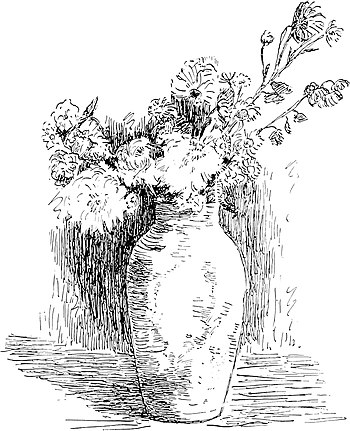
“A Study from Nature.” By Dorothy Ochtman, age 12. (Gold Badge.)
An Episode in French History.
By Francis Marion Miller (age 15.)
(Gold Badge)
To France goes the honer of having built the first fleet of ironclads, the battleships that succeeded L’ Orient, Victory, and Constitution, and out of which has developed the powerful fighting machines of to-day. In 1854 France constructed four ironclads that a year later sailed with her fleets co the Crimean War. Three of these boats were formed into a squadron. The first test of the real value of these vessels was at the mouth of the Dnieper River, where they were ordered to assault the forts of Kinburn. These fortifications had successfully resisted the attacks of the combined fleets of the allies.
The French vessels sailed confidently on, and closing in with the forts the battle commenced. Shots literally poured out of the ships and forts. The fire of the French did dreadful damage. A great shot plowed into one fort, nearly destroying it, and casting earth and debris far from where it struck. The forts were fought gallantly and stubbornly, but to no avail. The shots that found their mark and hit the French boats made no impression on their formidable foe. When the action commenced, the thunder of battle was frightful to hear. A cloud of smoke hovered over the combatants like a death pall, pierced here and there by vivid flashes of fire. At first the number of flashes was blinding, the reports deafening, the thought of what was going on terrible to meditate. Gradually, however, on the land side, the flashes and reports diminished ta an occasional demonstration as one by one the forts were silenced. The smoke-cloud, lifting from over the ruined forts of Kinburn, lifted from over an important episode in French history.
This battle marked the beginning of the era of iron and steel, that succeeded wood in naval construction. Since then hundreds have been killed, thousands have been wounded, millions of dollars have been destroyed in naval warfare. The battle-ships of to-day could at a single broadside destroy those gladiator: of the Crimean War. But our modern fighting vessels are merely great developments of those French ironclads which, that memorable day, at the mouth of the Dnieper Riser, so gallantly upheld the honor of France, and planted the event of the bombardment af the forts of Kinburn among the foremost episodes of the world’s history.
This was the first battle in which ironclads participated.
Lost or damaged League buttons will be replaced without charge on application.
MY GREATEST PLEASURE.
By Katharine Rutan Newmann (age 11.)
(Silver Badge)

“Distance.” By Miles W. Weeks, age 17. (Gold Badge.)
Jeanne d’ Arc.
By Persis Parker (age 14.)
(Gold Badge)
The great audience-hall of the Chateau Chinon was ablaze with light. The polished white walls reflected the sparkle of jewels and the sheen of satin and silk.
“Nay, queen mother, she is no witch—only a simple country maid.”
“You will not give her a private audience, Charles?”
“The ladies wish to see this soldier peasant girl, so let her come here.”
This conversation took place between Prince Charles VII of France and Yolande, the queen mother. Suddenly a blare of trumpets silenced all laughter, and only whispers were heard in the great room; the side doors were thrown open, and Jeanne d’ Arc entered. Her fine dark eyes shone with excitement, and an almost holy tight seemed to play round her whole figure, which was clothed in armor.
As she advanced, murmurs of amazement were heard on all sides. Her movements were graceful, and not a sign of the strangeness of her position passed over her pale white face. In the canopied chair of state a handsome youth played the part of the Dauphin, while the weak features of Charles were seen near the doors. Jeanne did not mistake for a moment this lad for the Dauphin, but with supernatural instinct turned to Charles.
“I am sent of God, noble prince,” she said, “to raise the siege of Orléans and to see you crowned at Rheims.”
Charles, impressed by this, led her aside and into an alcove where the moonlight streamed through an open window. No one knows what was said, but some of the strength and light seemed to be transferred from Jeanne’s face to that of the Dauphin. They continued in conversation for some time, then Charles led Jeanne back into the hall with the reverence due a princess, and gave her over to one of the court ladies. Just before he left her, he stooped and kissed her hand.
Thus Jeanne d’Arc, the peasant girl of Domremy, the savior of France, began her mission which ended with her death on May 30, 1431.

“Distance.” By Edward A. Miles, age 10. (Gold Badge.)
PLEASURE.
By Alice Trimble (age 9.)
(Silver Badge-winner)
Vercingetorix.
By Marian van Buren (age 8.)
(Gold Badge)
I have just got as far as Louis NIII in French history, and one of the episodes which impressed me very much was the story of the noble Vercingetorix. He was born in Arvenre, which is now called Auvergne, and lived at the time when Cæsar invaded France—58 b.c.
Vercingetorix was a very brave and noble man, and as the Gauls knew this they chose him for their chief.
For some time they succeeded in checking the Romans gloriously, but after a time Cæsar shut Vercingetorix and his army up in Alesia. For a long time Vercingetorix defended the town splendidly, but at last all their provisions were exhausted, and his army died of hunger, and only he and a few other soldiers were left. He knew it would have been impossible to drive the Romans away; so he determined to go and give himself up to Cæsar and implore him to withdraw and to spare his country; so he put on his best suit of armor, mounted his finest horse, and going alone before Cæsar, he threw his armor and sword at Cæsar’s feet. Cæsar had not a kind heart, and instead of admiring the great devotion of Vercingetorix, he had him put in chains and sent him to Rome, where he kept him in prison for six years.
After this long, dreary time he had the cruelty to execute this hero who had so bravely defended his country.
THE PLEASURES OF DREAMING.
By Dorothy Agnes Caffin (age 15.)
(Silver Badge-winner)
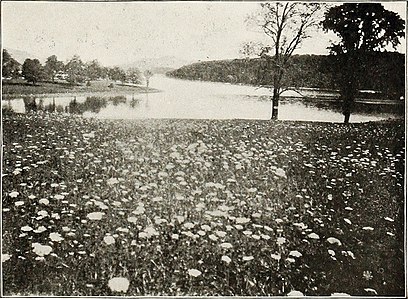
“Distance.” By James M. Walker, age 13. (Silver Badge.)
An Episode in French History.
By Elizabeth Wilson Pardee (age 15.)
(Honor Member)
In 885 a.d., during the reign of Charles the Fat, Rollo, a gigantic Norse chief, who was so large that no horse could carry him, resolved to conquer France. Sailing up the river Seine to Paris with seven hundred vessels and thirty thousand warriors, he besieged it for a year and a half. Then as the city would not surrender, he fell back to Rouen, and tried to obtain possession of the surrounding country.
A few years later, Charles the Simple, who occupied the throne at that time, found chat he was no match for the Northmen, so hoped to make peace by offering Rollo the privilege of marrying the daughter of the archbishop of Rouen and a gift of one thousand square miles around the city. The only condition the king imposed was that Rollo should acknowledge him as his sovereign. To this Rollo made no objections, knowing that he could keep or break his oath of allegiance as he chose.
At a great assembly, King Charles made the grant in solemn feudal form. Rollo was then informed that all that remained to complete the ceremony was for him to show his allegiance to the king by kissing his Majesty’s foot.
“Never!” answered the barbarian, fiercely. “I will bow the knee to no one, much less kiss any man’s foot.”
Rollo, after much urging from the archbishop, consented to go through the performance by proxy, and ordered one of his warriors ta kiss the king’s foot. The man obeyed, but instead of kneeling, jerked the king’s foot into the air so suddenly and forcibly that the monarch was sent sprawling backward, amid shouts of laughter from the spectators, who greatly enjoyed this part of the ceremony. The king recovered his dignity as best he could, but dared not expostulate.
He was satisfied now that he had gained his one great object, which was peace with the Northmen.

“Distance.” By Seward P. Simons, age 15. (Silver Badge.)
An Episode in French History.
By Elizabeth Wilson Pardee (age 15.)
(Honor Member)
An, interesting episode in French history, to me, was the banishment of one of the congregations, a teaching order, during the present historical epoch. the separation of the church end state.
My sister and I were at a French religious school just inside the boundaries of France, a short distance from Geneva. The place was beautifully situated between the Salève Mountain and the Arve River. The school buildings were fine and large, and the estate produced everything required for food, even the wine.
The mothers, or teachers, were very kind and good, and although we are not Roman Catholics, we were very happy, and made many warm friends among them.
One morning at breakfast, early in July, 1903, we found, to our amazement, that none of the mothers had slept the previous night—and no wonder, poor things! for we learned later, what they had known the night before, that the French government had given them notice to leave France at once, and would also confiscate their property.
This seemed very hard, because not more than twenty years before they had been compelled to leave the canton of Geneva, where they had first established their school.
It happened that the order owned a house in Fribourg, and it was decided that the school go there; and, although Fribourg is the Roman Catholic center of Switzerland, the mothers thought it best to disguise themselves as people of the world, and no one was to know they were a religious house. One mother returned to her own family, and others were scattered in different schools in various parts of the world.
Of course they had to let their hair grow, and it was very funny to hear how “Mère Allouisé” was able to use two hairpins and “Mere Geneviève” three. And one would not recognize these same mothers when ready to leave, they were so changed.

“Distance.” By Lawrence Sheridan, age 17.
My sister and I helped at the sale of their household possessions, and it was very sad indeed.
The Swiss custom-officers had surrounded the school property; they were even in the fields: and it was with difficulty that our vice-consul was able to get our luggage across Switzerland without paying duty.
I afterward had the great pleasure of seeing my favorite teacher, Mère Flavie, in Paris, when on her way to England to teach,
PLEASURE OF WINTER.
By Maud Dudley Shackelford (age 15.)
(Honor Member.)

“Yellowstone Deer.” By Lucy Williams, age 14. (First Prize, “Wild-animal photograph.”)
An Episode in French History.
By Helen Whitman (age 10.)
(Gold Badge)
Louis XI reigned king over Trance in the year 1461. Louis was very superstitious, He believed that a certain man whom he knew could forecast the future.
One time this man told Louis something that did not come true. The king was very angry. He was going to hang this astrologer who had told him such a falsehood. So he sent for the astrologer.
But when the astrologer came into the presence of the king and saw all the soldiers standing around he knew what Louis was going to do. So he fell to thinking what he should do. The king began to reproach him.
Then the astrologer said: “The stars may have made a mistake, or I did; but of one thing I am sure—that you will die a few hours after I die.”
So the king did not have the cunning astrologer hanged, for fear that he should die a few hours afterward.
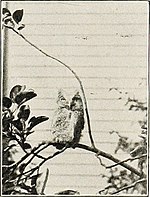
“Owl.” By Isabel Caley, age 12. (Second Prize, “Wild-bird photograph.”)
PLEASURES OF FEBRUARY.
By Gertrude A. Strickler (age 14.)
(Honor Member.)
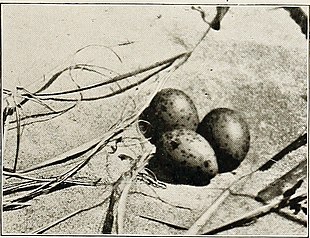
“Gull’s Nest” By Caro Kingman, age 12. (Third Prize, “Wild-bird photograph.”)
An Episode in French History.
By Frances Lubbe Ross (age 13.)
(Gold Badge)
When the young king, Louis XVI, married the beautiful Austrian princess, Marie Antoinette, many of the old “grandes dames” of the French court were shocked by the young queen’s light and somewhat frivolous manners, and her disregard of old formal customs. Her chief lady of the bedchamber, the Duchess of Naoilles (an old court lady who, though well-intentioned, was somewhat dull and tiresome, and very formal), reasoned with her, and tried to persuade her to acknowledge the customs of the court; but it was of no avail: the young queen laughed in her face, and even went so far as to nickname the duchess “Madame Etiquette.” On one occasion, Queen Marie Antoinette was riding a donkey, and the little beast, falling, threw her to the ground. She sat there laughing, her merry eyes sparkling, and could not be persuaded to rise until the Duchess of Noailles came up to where she sat, much shocked by such romping; then, putting on a grave, inquiring face, she asked in a mischievous voice:
“Pray, Madame Etiqnette, when the queen and her donkey both tumble dawn together, which ought to be the first to get up?”

“A Study from Nature.” By Cordner Smith, age 16. (Honor Member)
PLEASURES—A SONNET.
By Agnes Churchill Lacy (age 17.)
(Honor Member.)

“Distance.” By Joseph S. Web, age 13. (Honor Member)
An Anecdote of the Days of Napoleon.
By Philip Warren Thayer (age 11.)
During the year 1804 Napoleon was threatening to send an army to England, and boats were made ready, many of which were supposed not to be seaworthy, and the people who doubted Napoleon's intentions made a great deal of fun of them. Some called the ships “Walnut Shells,” and declared that they would sink before they reached England. During this time there was a play given at a Paris opera-house in one scene of which an actor appeared on the stage eating walnuts. There was a tub of water before him, and he placed the shells in this and carefully floated them around. Another actor cane in from behind the scenes and asked him what he was doing.
“Oh,” he said, ‘I am making boats for the emperor’s flotilla.”
When the audience heard that they fairly roared with laughter. The following day this came to the ears of the authorities, who gave an order forbidding it to be repeated. The next night the same play was produced, and the man put the shells in the tub as before.
When asked again what he was doing, he said:
“Oh, I know, but I also know enough not to tell.” The audience laughed londer than before. The man was never punished.
A FEBRUARY PLEASURE.
By Harold R. Norris (age 12.)
(Honor Member.)
THE HILLS OF JOY.
By Roy Randall (age 14.)
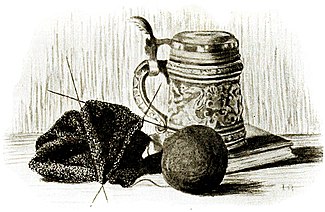
“A Study from Still Life.” By Irma T. Diescher, age 16.
PLEASURE AND FUN.
By Marguerite Weed (age 13.)
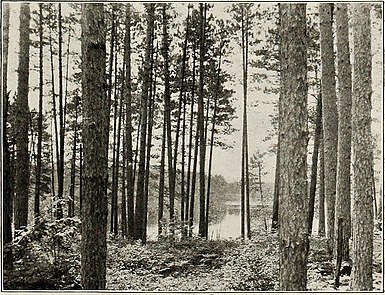
“Distance.” By Charles Ford Harding, Jr., age 14.
My Favorite Episode in French History.
By Dorthea Gay (age 16.)
During the winter of 1814-15 all France was in a fever of excitement and discontent. The emperor had abdicated and taken up his enforced residence on the island of Elba, and the royal power was held by a Bourbon, Louis XVIII. No one liked the new rule. It satisfied neither the Bonapartists nor the royalists by its policy. Napoleon himself had said: “The Bourbons will put France at peace with Europe, but how will they put her at peace with herself?” The lilies brought nothing with them but civil strife.
Meanwhile the exiled monarch kept himself posted upon affairs in Paris, and spent his time preparing the few ships and men left him for a sudden departure. On the twenty-sixth of February, knowing that the British vessel which acted as a spy on his movements had gone to Leghorn, he hastily embarked.
On the first of March he landed at Gulf Juan and began his famous march to Paris. At first no troops were sent against him, for Paris was not yet awake to the fact that he was really in France. As soon as they realized, however, that he was almost upon them, the Fifth Legion was sent to check his progress. Their former commander advanced to meet the men—alone.
“Soldiers of the Fifth,” he cried, “do you recognize me?”
“Yes, yes!” they eagerly replied.
“And is there a man among you,” he continued, “who would fire upon his emperor?”
This was too much; and rushing forward with shouts of “Vive l'Empereur!” they surrounded him, and throwing themselves upon him, embraced his feet in their enthusiasm of love and adoration.
This incident was only an example of what followed. The rest of the journey was one long triumphal procession. To send men against Napoleon was but to enlarge his forces. Marshal Ney was looked to as a last resort; but when he understood the situation, he yielded to the force of circumstances and joined the invader. On the night of the nineteenth of March the king fled from Paris, and the next evening, amid the rejoicings of the people, the emperor entered the city.

“Heading.”
By Margaret
Mickeon, age 15.
PLEASURE.
By Leo F. Miller (age 16.)
New Chapters.
No. 776. “Ye Twentieth Century.” Evelyn Franck, President; Inez Wolf, Secretary; eight members. Address, 306 West 99th St., N. Y. City.
No. 777. Laura Thomas, President; Charlotte Way, Secretary; eight members. Address, Oxford, Pa.
No. 778. Margaret Davidson, President; Helen Irvine, Secretary; four members, Address, 1552 Fifth Ave., New Brighton, Pa.
No. 779. Florence Davis, Secretary: three members, Address, 112 West 76th St. N. Y. City.
No. 780. “The Busters.” Sarah Lauyshiere, President; Norma Denison, Secretary; eight members. Address, P. O. Box 222, Berlin, N. Y.
No. 781. Eugenie Root, President; Margery Russell, Secretary; eight members. Address, 407 Jefferson Ave., Detroit, Mich.
No. 782. “St. Nicholas Six.” Watson Dazier, President; Simeon Nathan, Secretary; six members. Address, 202 East St. Redding. Cal.
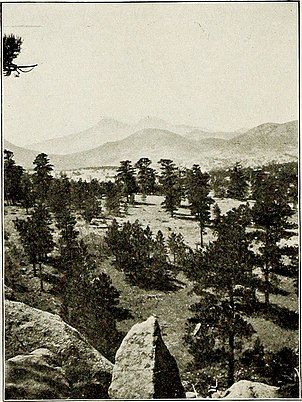
“Distance.” By Anna R. Kennedy, age 13.
League Notes and Letters.
Once more we are obliged to print a Roll of the Forgetful, it being a list of these who did not put their ages on their contributions, thereby excluding them from the competitions. The roll this month is as follows:
Corinne Benoit, Cori Stearns, Katharine A. Potter, Rudolph Leding, Charles W, Williams, Mary Wilson, Frieda H. Tellkampf, Margaret Armour, Margaret Locan, Helen Gardner Waterman, Laura Sleeper, Anna A. Flichtran, Lawrence Arnold, Mary Daly, Ethel Owens, Roy Chapman, Walter K. Ashmead, Helen Lee, Margery Livingston, Beulah Roughner, Lylic Finck, John II. Boyle, and George H. Plough.
The League editor is in receipt of two numbers of the “Holiday Magazine,” of 39 Norfolk Square, London, England. This periodical is issued three times a year,—in the Easter, summer, and Christmas holidays,—and the profits from its sale are given to the “Guild of the Brave Poor Things.” In a letter from the editors we are told:
We get a celebrity to write in each number: for instance, last Christmas we had Mary Cholmondeley, author of “Red Pottage,” etc.; last Easter, as you will see, E. F. Benson, author of “Dodo,” etc.; and in the summer one Anstey Guthrie, author of “Vice Versa,” etc. We print it ourselves on a little printing machine called the “Model.”
As you will see, it is divided into three parts—one for contributors above fifteen years of age (that belongs to my brother of sixteen years), one for those below fifteen and over nine (I take that part, as I am twelve}, and the other for contributors below nine, which last is conducted by my small brother of eight years.
It would be so much help to us in getting contributors if you would honor us by mentioning our little periodical in your pages, and asking people who wish to contribute to write for particulars to the above address,
With best wishes from my fellow-editors, George and Stephen Benson, I remain,
Yours sincerely,
Stella Benson.
Certainly the “Holiday Magazine” is a novel and worthy enterprise, and deserves all the success it has attained, which is very considerable.
Brookline, Mass.
Dear St. Nicholas: I was interested to see in the November St. Nicholas a picture of a gull’s nest, because any I saw this summer were just little hollows in the sand with eggs in them. One day, at Prince Edward Island, I saw as many as fifty sets of eggs and not a nest among them. Inclosed is a picture of one of them that I took, also a photograph of an egg—an egg partly open with a bill protruding—and a young bird as I saw then.
Your loving reader,
Caro Kingman (age 12).
Providence, R. I.
Dear St. Nicholas: When my beautiful gold badge came I thought that I must write at once to thank you for it, but I have tried again and again, and I find that I cannot tell you how pleased I am with it, or how much I thank you for it, You have encouraged me to try still further and to be willing to wait too, which is the hardest thing. I can be a competitor now only for a year, but I shall always be your very interested reader.
Very sincerely,
Caroline M. Morton.
NOTICE.
The St. Nicholas League is an organization of the readers of Dear St. Nicholas Magazine, with a view at artistic and literacy improvement. The membership is free, and instruction leaflet and membership badge will be sent free on application.

“A Heading for February.” By Will Byrnes, age 10. (Silver Badge.)
Germantown, Pa.
Dear St. Nicholas: I have been a member of your League for five years and am very much interested in the drawing competitions. I cannot begin to tell you what a help the League has been to me, for I know that my work has improved greatly since I first received my membership badge. I often wonder if you can really know what a gold or silver badge means to those of your members who for several years have struggled hard for it. I shall never forget how I felt when I received my silver badge. But I shall not rest contented here; I mean to win the first prize. I compete nearly every month, and, though I do not reach the goal I have. set for myself, I will not be discouraged—I will not stop trying until I win the gold badge. I am writing to ask you if, sometime in the near future, we may have a drawing competition for which we may choose our own subjects. I should enjoy it very much, dear St. Nicholas, and I feel sure that some of the other members would also. Hoping that you will grant my request, I am,
Your enthusiastic League member,
Florence Gardiner.
Düsseldorf, Germany
Dear St. Nicholas: Seeing your notice in the April number, requesting the names of past members who have graduated as paid workers, I take pleasure in sending you my name as one of these.
I have done every kind of work for seven different firms, including Raphael Tuck, for whom I regularly make picture post-cards.
I am now nineteen years of age.
I have come over here to study at the Art Akademie for some time.
Perhaps later on I may have the pleasure of submitting some of my work to you.
Sending you hearty good wishes for the League and its promoters, I remain,
Yours faithfully,
W. B. Huntly.
PS. I only wish the League were better known in Great Britain. It gave me an upward impetus, for which I am thankful to you. Would it be worth your while to insert an advertisement in such a magazine as “The Captain”? This would reach the right class of readers in England, I met very few people indeed who knew anything about St. Nicholas at all. W. B. H.
Yarbro, N. C.
Dear St. Nicholas: I send you to-day my poem on “Pleasure.” I dearly love to write for you. I have learned so much by doing so, and if I can no longer win prizes I shall continue to write.
Your faithful member,
Maud Dudley Shackelford.
New York, N. Y.
Dear St. Nicholas: I can’t tell you how pleased I was to find that I had won a silver badge in the last competition. I have often tried, and been on the honor roll, but I hardly thought I would ever join the ranks of prize-winners. It seems so strange to see one’s own little effusion in print.
The badge, I think, is very, very pretty, and I am extremely proud of it. I want to thank you for your kindness in giving it to me. You don’t know what an encouragement it is.
It seems to me that every one I know has heard about it even my teachers. It shows how many friends St. Nicholas has.
I very seldom compete during winter, when I am busy at school, but perhaps next summer I shall try again.
Thanking you again for your lovely prize, I am,
Your very sincere friend,
Harriet Ruth Fox.
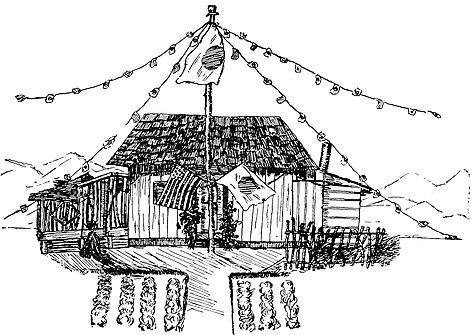
“A Study from Nature.”—A Japanese House in California, Mikado’s Birthday. By Dulcebella Barbour, age 12. (Silver Badge.)
Florence, Italy
Dear St. Nicholas: I want to write and tell you how much I enjoy your article on “How to Study Pictures,”? which came out in the [[{{{work}}}|November number../../Number 1]]. I am very much interested in it, as I have been seeing a great many of them over here. I have seen, here in Florence, the ones by Cimabue, Giotto, Memling, and Albrecht Dürer. In Memling’s I especially looked at the small landscapes mentioned, and what I thought quite strange was how very realistic the rug in it looked. I also examined the details mentioned in the other pictures, which helped me a great deal in my studies of them. I am looking forward with much pleasure to the next numbers.
Your sincere reader,
Charles M. Pfoulke, Jr. (age 15).
Other valued letters have been received from Donald Jackson, Dorothy Wimick, Helen George, Evelyn G. Patch, Gladys L. Carroll, Margaret Spahr, Zena Parker, M. McKeon, Dorathy S. Bradford, Mary E. Pidgeon, Florence C. O'Rourke, Katharine Marble Sherwood, Josephine E. Swain, Natalie Wurts, Meg Greenless, William A. R. Russum, Dorothy Arnold, Jeanette P. Hunt, Marjorie Macgregor, Dorothy Weiman, Mary Gorgas, and Eleanor Wyman.
The Roll of Honor.
No. 1. A list of those whose work would have been published had space permitted.
No.. 2. A list of those whose work entitles them to honorable mention and encouragement.
VERSE 1.
- Roscoe H. Vining
- Alleme Langford
- Catharine H. Straker
- Grace Leslie Johnston
- J. Horton Daniels, Jr,
- Dorothea Thompson
- Emily Rose Burt
- Ruth P. Getchell
- Mary Elizabeth Mair
- Eleanor Moody
- Ann Drew
- Doris Neel
- Elsie Moore
- Emmeline Bradshaw
- Janet Buchanan
- Kathryn Macy
- Mary Winslow
- Hélène Mabel Sawyer
- Elizabeth Morrison
- Alta Lockwood
- Ruth H. Keigwin
- Ruth McNamee
- Nannie Clark Barr
- Beulah H. Ridgeway
- Phyllis Brooks
- Julia Dorsey Musser
- Julia S. Ball
- Eleanor McGrath
- Eleanor R. Chapin
- Thoda Cockroft
- Rosalie Elizabeth Dufour
- Eleanor Johnsoa
- Helen Dekum

“A Study from Nature.” By Jessie C. Shaw, age 17.

“A Study from Nature.”
By Alice E. Kingman,
age 15.
VERSE 3.
- Florence Louise Adams
- Aline de Maret
- Melicent Eno Humason
- Olive L. Jenkins
- Hanna D. Monaghan
- John L. Gallagher
- Eugene Scarhorough
- Arvine Keily
- Caroline Coit Stevens
- Counna Long
- Kathleen Love Watkins
- Inez Pischel
- Catherine E. Jackson
- M. Lewenberg
- Josephine E. Swam
- Mary M. Dabney
- E. Marguerite Routledge
- Dorothy St. John Mildmay
- Lucius Hicks
- Margaret Acomb
- Constance Gardner
- Ruth Albert
- Alma Liechty
- Robert H. J. Holden
- Reinhart Kaufmann
- Edward L. Goodwin
- Susan Warren Wilbur
- Kathryn Rothschild
PROSE 1.
- Elizabeth Reed Eastman
- Mary Thornton
- Mary Pemberton Nourse
- Helen Irvine
- Thomas H. DeCator
- Katharine Marble Sherwood
- Marie Armstrong
- Anne L. Parrish
- Annette Windele
- Ivy Varian Walshe
- Louis D. Edwards
- Jeannette Winifred Hawkes
- Elsie F. Weal
- Gwendolen Haste
- Jessy Caverhill
- Vincent M. Ward
- Laura Thomas
- R. P. Cotter
- Mildred Saltonstall Huntington
- Susan M. Molleson
- Lucinda W. Reed
- Manuel Francis Barranco
- Volant Vashon Ballard
- Eleanor Hathorne Bailey
- Margaret Carpenter
- Lillian Heartt Lang
- Esther F. Aird
- Helen Davenport Perry
- Primrose Lawrence
- Gladys Virginia Stewart
- Elizabeth Toof
- Alice G. Peirce
- Helen W. Irvin
- Vieva Marie Fisher
- Katharine Monser
- Marguerite Schorr
- Margaret F. Grant
- Mildred Stanley Fleck
- Helen Platt
- Madeleine Dillay
- Philip Francis Leslie
- Alfred P. Merryman
- M. Connaughton
- Dorothea da Ponte Williams
- Phyllis M. Clarke
- Mildred Ockert
- Kathleen Soule
- Frederick A. Coates
- Margaret Douglass Gorden
- Gertrude Coit
- Mildred March
- Ray Murray
- Mary Schwah
- Florence Benn
- Marjorie Gabain
- William Carson
- Morris Tinsley
- Marta Cardenal y Pujals
- Marion A. Rubicam
- Paul Ockert
- Eleanor Ellis Perkins
- Henrietta McIvor
- Elizabeth Brady
PROSE 2.
- Francisca Blaauw
- Roy I. Clampitt
- Carlotta Welles
- Helen J. Simpson
- Marguerite Tenell Pressly
- Allen Frank Brewer
- Bessie Bunzel
- Margaret Greenshields
- Charles Henriques
- Mary Frick Jenmson
- N. Reynolds
- John C. Mosher
- Lawrence Doolittle
- David B. Campbell
- Irene Brown
- Mary Lena Wilson
- William Dodge Home, Jr.
- Edith J. Minaker
- Elisabeth Totten
- Margaret Johnson
- Agnes M. Frank
- Margaret Ewing
- Rose Marie Wise
- Dorothy Bedell
- Stanley Merton Merrill
- Edwarda Crandall
- Sylvana Blumer
- Edward S. Ingham
DRAWINGS 1.
- Henry C. Hutchings
- Ella Preston
- Mildred Eastey
- Elizaheth MacL. Rabinson
- Lauren Ford
- Carrie M. Jordan
- Theresa R. Robbins
- Marjone Newcomb Wilson
- Dorothy Quincy Alexander
- Vera M. Demens
- Ethel Messervy
- Charlotte Waugh
- W. Clinton Brown
- Shirley Willis
- Genevieve Ledgerwood
- Isabel Williamson
- Margery Bradshaw
- Helena B. Pfeifer
- Joseph B. Mazzano
- William Whitford
- John A. Ross
- L. Fred Clawson, Jr.
- Margaret A. Dobson
- W. E. Huntley
- Jessie C. Shaw
- Avis Ingalls
- Robert E. Jones
- Hazel Pike
- Ruth Collins
- Carina Eaglesfeld
- Edna B. Tuthill
- Dorothy Dunning
- Derothy Grace Hamilton
- L. Irving Beach
- Katharine Duer Irving
- Betty Brabrook
- Mary McLeran
- Lucy D. B. Porter
DRAWINGS 2.
- Victor St. Sears
- Margaret Lantz Daniell
- Charles Vallee
- J. C. Prewitt
- Marie Atkinson
- Thomas H. Foley
- Mildred C. Jones
- Margaret Balfour Ker
- Raymond Rohn
- Carol Veblen
- Horace G. Stewart
- Ella R. Brock
- Bessie T. Griffith
- Lucia Northey
- J. S. Lovejoy
- Marion K. Cobb
- May Frasher
- Elmira Keene
- Marjorie Chisholm
- Gladys L’E. Moore
- Maisie Smith
- Virginia McLaughlin
- Emily W. Browne
- Beatrice S. Fulton
- Carol N. Sherman
- Kate Sprague DeWolf
- Harriette Barney Burt
- Aline J. Dreyfus
- Herbert C. Jackson
- Frances Kathleen Crisp
- Olive Mudie-Cooke
- Elizabeth G. Freedley
- Jack George
- Doris L. Nash
- Margaret Hazen
- Albert Hart
- Christina R. Fisher
- Elizabeth R. Wright
- Henry Stender, Jr.
- Roger K. Lane
- Maude Whitten
- Bina May Moseley
- Winifred Littell
- Bessie B. Styron
- Josephine Quensel
- Mildred Bent
- Raymond Foley
- Phœbe Hunter
- Dorothy Gibson
- Nellie Price
- Ida W. Pritchett
- Washington C. Huyler
- Marguerite Jervis
- Elsa Hempl
- Mary Ominsky
- Dorothy G. Stewart
- Natalie Johnson
- Charles K. Gavin
- Dorothy Foster
- Margaret Dow
- Margaret Richardson
- Adelaide Stiles
- Evelyn Buchanan
- Eleanor S. Wilson
- Effie Owen
- Adelaide Chamberlin
- Benson B. Hageman
- Andrew Bisset
- Annie T. Smith
- Harold Parr
- Marian Walter
- Zella LaBarre
- Jack Huyler
- Robert Strain, 3d.
- Rose Briggs
- Ellbert Baldwin
- Grace Noble
- Prudence Ovington Ross
- Fred Neile
- Mary B. Ellis
- Mary Klauder
- Besste Bocage
- Reatrice Taylor
- Katharine Osbourne
- Franklin Spier
- Clara Smith
- Helen Jervis
- Alice Wangenheim
- Wilhelmina Moloney
- Pamerny Graves Hubbard
- Hall Clement
- Thurlow Merrill Prentice
- Alfred B. North
PHOTOGRAPHS 1.
- Carl A, Stearns
- Dorothy Gore
- Clarence A. Manning
- Emily Sibley
- Samuel M. Janney, Jr
- Mary M. R. Rebill
- Warren L. Irish
- Alice George
- Mark Curtis
- Foster Townsend
- Lilla E. Diebnan
- W. F. Harold Braun
- Robert W. Williams
- Gale Hunter
- Harold Fav
- Harold L. Williamson
- Piero Colonna
- Evelme P. Weeks
- Walter I. Badger
- Gladys Stewart Bean
- Robert S. Platt
- Dorothy Gardiner
- J. E. Fisher
- Juanita R. Harmar
- Edwin Augustus Acker
- Will Wood
- Katharine E. Marvin
- Elizabeth H. Webster
- Frederic C. Smith
- S. Butler Murray, Jr.
PHOTOGRAPHS 2.
- Martha G. Schreyer
- Sally C. Bent
- George Hill
- Ruth Kellogg Pine
- Doris F. Newell
- Canema Bowers
- Flournoy A. Hopkins
- Alpha Helen Furley
- Mary E. Glassner
- Thomas Johnson
- J. Gordon Fletcher
- Zelie M. Eberstadt
- Edward E. Bolte
- Mary K. Warren
- Karl M. Mann
- Ruth H. Caldwell
- Phyllis B. Mudie-Cooke
- Jennie Fry
- Frances Strong
- Alec Sisson
- Mary Weston Woodman
- Walter 5. Marvin
- F. W. Foster
- Rebecca J. Charry
- Elizabeth Crane Porter
- G. A. Priest
- Helen M. McCurdy
- Theodosia Longenecker
- Elizabeth Osgood
- Julia M. Addison
- Harriet W. Gardiner
- Florence Murdoch
- Winifred M. Voelcker
- Helen McIvor
- Max Plambeck
- Dorothy Winslow
- R. Guggenheime
- Edward L. Worrell
- Edna Stevens
- Katharine Donohoe
- Betty Willett
- Marie Russell
- Lois M. Hitchcock
- Orîan E. Dyer
- Mildred F. Coes
- Laurence A. Morey
- Pendleton Schenck
- Eugene White, Jr.
- Carl Glick
- Helen Wing
- Florence C. Irish
- Matilda G. Carnochan
- Florence Isabel Miller
- Winters Coldham
- Clarence E. Simonson
- Ruth Greenoak Lyon
- Pat Kirby
- H. Ernest Bell
- Albert Nalle
- Pau) Wormser
- Dorothy Arnold
- Gilberta Crater
- Donald McIlvaine
- George Grady, Jr.
- Denald C. Armour
- Phœbe Hart Smith
- Marjorie Parks
- Katharine C. Miller
- Ethel Burgess
- Ignacio Ranier
- Constance Freeman
- Allene Crane
- Henrietta Mclvor
- Mary Canfield
- Richard Dana Skinner
- Helen L. K. Porter
- Willian H. DuBarry
- Eleanor W. Hobson
- Henry S. Kirshberger
- Dorothy Wormser
- Wille E. Crocker
- Harry C. Lefeber
- Marguerite Hyde
- Alice J. Sawyer
- Hilliard Comstock
- Alice Pine
- Katharine E. Pratt
PUZZLES 1.
- Katharine King
- E. Adelaide Hahn
- Russell S. Reynolds
- Elizabeth Palmer Loper
- David W. Colpitts, Jr.
- Anna Zelley
- Gladys Richardson
- Margaret Webster
- Edmund P. Shaw
- Ruth Perkins
- Olga Maria Kolff
- Elsie Wormser
- Florence A. Brooks
- Elizabeth Beal Berry
- Richard S. Bull
- Oscar Cobb Lautz
PUZZLES 2.
- Warde Wilkins
- Ruth MacLure
- Harry Bernstein
- Harry W. Hazard, Jr.
- Manuelita Kolfold
- Zena Parker
- Margaret Botticher
- Lilian S. Clapp
- Edwin Fockler
- Edna Krouse
- Alice D. Karr
- Robert A. Milliken
- 8. T. Devan
- Gerald Smith
- Marjorie Shriver
- Arthur J. Goldsmith
- Frances R. Johnson
- Jessie Adams
NOTICE.
The League editor will be glad to receive suggestions as to subjects for the competitions. Some of the best have come from members. Their assistance in editing this department is always welcome.

“A Heading for February.”
by Leonard Ochtman, age 10.
Prize Competition No. 65.
The St. Nicholas League awards gold and silver badges each month for the best poems, stories, drawings, photographs, puzzles, and puzzle-answers. Also cash prizes of five dollars each to gold-badge winners who shall again win first place. This does not include “Wild Animal and Bird Photograph” prize-winners.
Competition No. 64 will close February 20 (for foreign members February 25). The awards will be announced and prize contributions published in St. Nicholas for May.
Verse. To contain not more than twenty-four lines. Title: to contain the word “Home.”
Prose. Article or story of not more than four hundred words. Title: “*A Kind Deed.’ Must be true.
Photograph. Any size, interior or exterior, mounted or unmounted; no blue prints or negatives. Subject, “An Old Relic.”
Drawing. India ink, very black writing-ink, or wash (not color), interior or exterior. Two subjects, “My Favorite Fancy” and a Heading or Tailpiece for April.
Puzzle. Any sort, but must be accompanied by the answer in full, and must be indorsed,
Puzzle-answers. Best, neatest, and most complete set of answers to puzzles in this issue of St. Nicholas. Must be indorsed.
Wild Animal or Bird Photograph. To encourage the pursuing of game with a camera instead of a gun. For the best photograph of a wild animal or bird taken in its natural home: First Prize, five dollars and League gold badge. Second Prize, three dollars and League gold badge. Third Prize, League gold badge.
RULES.
Any reader of St. Nicholas, whether a subscriber or not, is entitled to League membership, and a League badge and leaflet, which will be sent on application.
Every contribution, of whatever kind, must bear the name, age, and address of the sender, and be indorsed as “original” by parent, teacher, or guardian, who must be convinced beyond doubt that the contribution is not copied, but wholly the work and idea of the sender. If prose, the number of words should also be added. These things must not be on a separate sheet, but on the contribution itself—if a manuscript, on the upper margin; if a picture, on the margin or back. Write or draw on one side of the paper only. A contributor may send but one contribution a month—not one of each kind, but one only. Address:
The St. Nicholas League,
Union Square, New York.

“A Tailpiece for February.” by Willard Sebberling, age 12.
